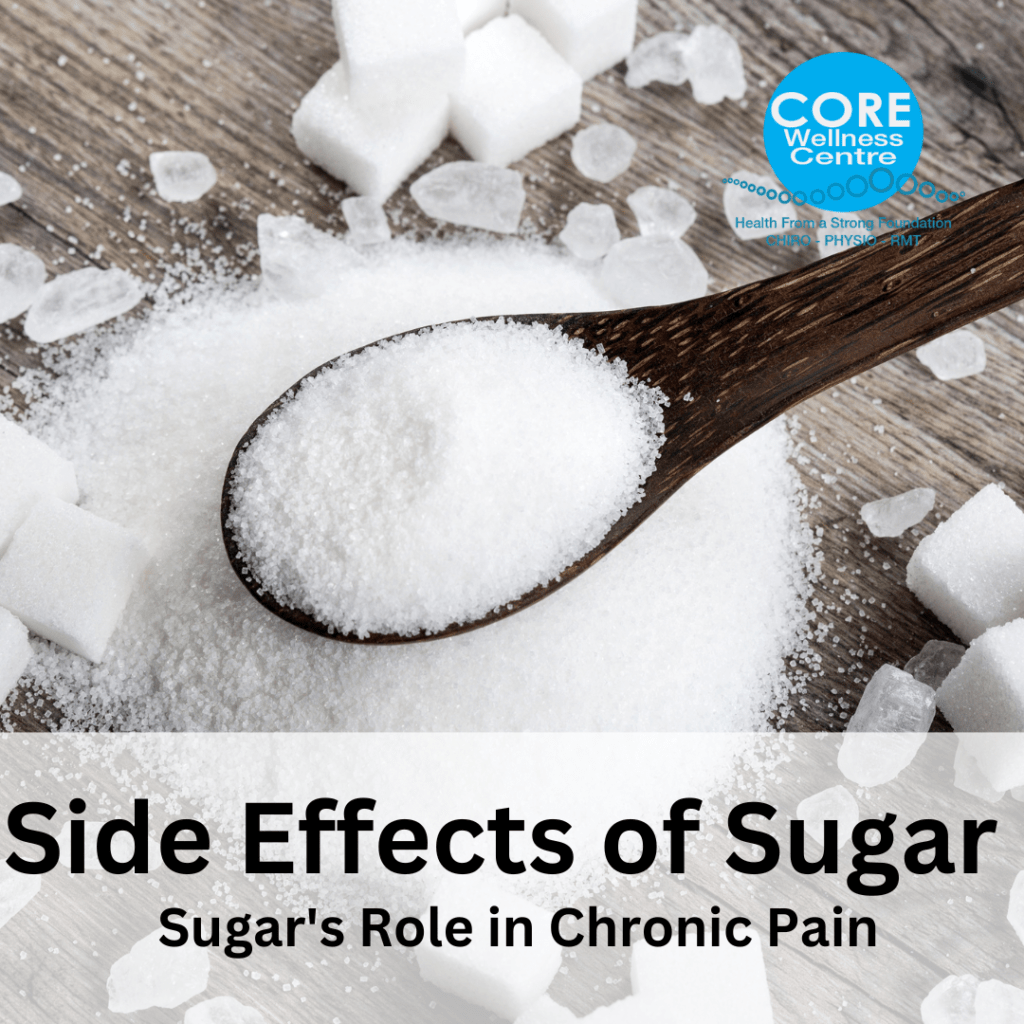
To uncover the hidden links between sugar and chronic pain, we will delve into the role of inflammation and its impact on our well-being.
It’s time to unravel the complexities and empower ourselves with knowledge that can lead to a life free from sugar-induced chronic pain.
The Sugar-Chronic Pain Connection
In the intricate tapestry of our modern diets, the side effects of sugar play a central role that extends far beyond its role as a sweetener. Research has increasingly shown that excessive sugar consumption can be a significant contributor to the development and exacerbation of chronic pain conditions.
At its core, the sugar-chronic pain connection revolves around the inflammatory response triggered by high sugar intake. Consuming large quantities of sugar can lead to a surge in inflammatory markers within the body, setting the stage for a cascade of effects that contribute to chronic pain.
Inflammation, not only serves as a protective mechanism in the face of injury or infection but, when chronic, becomes a driver of various pain conditions.
The body’s attempt to defend itself becomes a source of ongoing discomfort, affecting joints, muscles, and other tissues.
Understanding this connection is crucial for those seeking relief from chronic pain, as it highlights the importance of addressing not just the symptoms but also the underlying factors contributing to the pain experience.
Statistics show that the average yearly consumption of sugar in North American adults is in the order of 120 to 150 lbs per year!
The biggest culprit in the average diet is soft drinks. One 12-ounce can of Coca Cola contains about 11 teaspoons of sugar.
The Side Effects of Sugar in the Body
1. Damages the immune system
Excess sugar in your body hinders absorption of vitamin C in the bloodstream. Vitamin C is essential for white blood cells as it help them in destroying viruses as well as bacteria. White blood cells require a large amount of vitamin C to successfully do their task of protecting you against diseases.
Therefore, eating too much sugar weakens your immune system making you susceptible to many diseases, such as cancer, asthma, multiple sclerosis, arthritis, Candida yeast infections and Alzheimer’s disease.
Furthermore, refined sugars does not contain minerals and vitamins. For it to get metabolized into your body it will have to draw upon your micro-nutrient stores which depletes them.
This process hinders cholesterol as well as free fatty acids metabolism causing high blood serum triglycerides and cholesterol. Over time, this can cause heart disease as well as obesity and is a sign for diabetes. Furthermore, since sugar lacks vitamins, minerals and fiber, it can weaken the endocrine system making it the major cause of chronic degenerative disease.
2. Damages the skin
Excess sugar in your body causes a natural process called glycation. This occurs when the glucose inside your bloodstream bonds with proteins to form detrimental molecules known as advanced glycation end products (AGEs).
As AGEs build up, they damage neighboring proteins.
The most common protein inside your body is the collagen. Once damaged, the usually springy and elastic collagen and elastin protein fibers turn out to be dry and fragile.
How Can we Reduce our Sugar Intake?
Despite the bad effects of sugar, you can start the process of restoring your health, by following five steps:
1. Limit your food intake of sugar. This does not mean completely avoiding eating sugary things but it does involve controlling the quantity you eat every day. You should eat less than 48 grams of sugar every day. Moreover, you should look for healthy sugar substitutes to gratify your sweet tooth.
A great way to get the sugary flavor you are looking for without the negative sugar effects is using nutrient dense smoothies. You should avoid eating refined sugar products and rather satisfy your craving by taking fruits. You should also avoid eating excess snacks, baked goods, candy and ice cream and leave them just as special treats.
2. Use foods which have vitamins B1 as well as B6. You can get this from foods such as sunflower seeds, coconut milk, banana, spinach and smoothies. Numerous studies have demonstrated that these vitamins can greatly reduce the production of AGEs.
3. Eat foods rich in antioxidants as well as smoothies rich in other phytonutrients.
4. Avoid eating foods with aspartame as the dangers of aspartame are severe, causing damage to the brain’s neural cells.
5. Sugars are ‘hidden’ in so many foods so be on the lookout when reading labels in the supermarket.
In general the more white the food, the more refined it probably is. The food then contains low levels of fiber and nutrients and high levels of calories so it’s best to avoid it.
At Core Wellness Centre, you can learn more about natural healthy living at our chiropractic, physiotherapy clinic in midtown Toronto.
Call Us for More Information on (416) 479 – 8311 or Click on the Link Below to Schedule Your First Appointment:

Core Wellness Centre Insights into Chronic Pain
As we navigate the landscape of sugar’s impact on chronic pain, a comprehensive approach is essential for effective relief.
Chiropractic care, provides adjustments and manipulations to alleviate pain associated with inflammation from the side effects of sugar.
At Core Wellness Centre, our Chiropractor Dr. Kris, DC. CACCP., understands the body’s interconnected nature and works to restore balance. This addresses the symptoms but also targets the root causes of chronic pain. Whether it’s through spinal adjustments or manually targeted manipulations, chiropractic interventions aim to enhance the body’s natural ability to heal and recover.
Complementing this approach are our team of Physiotherapists, RMT Massage Therapists and Osteopathy, in managing and preventing sugar-related chronic pain. The Core Wellness Centre Team bring a wealth of knowledge in movement and rehabilitation, offering targeted exercises, tools, techniques and strategies to improve flexibility, strengthen muscles, and enhance overall function.
By tailoring rehabilitation plans to individual needs, complimentary therapies become a vital component in breaking the cycle of pain from the side effects of sugar, empowering individuals to regain control over their physical well-being.
The collaborative efforts at Core Wellness Centre create a synergistic approach to the side effects of sugar. While chiropractic adjustments address alignment and functionality, physiotherapy complements these efforts by focusing on movement patterns and strengthening exercises.
Together, these form a powerful alliance, providing patients with a comprehensive toolkit for managing and overcoming chronic pain associated with sugar intake.
Call Us for More Information on (416) 479 – 8311 or Click on the Link Below to Schedule Your First Appointment:

